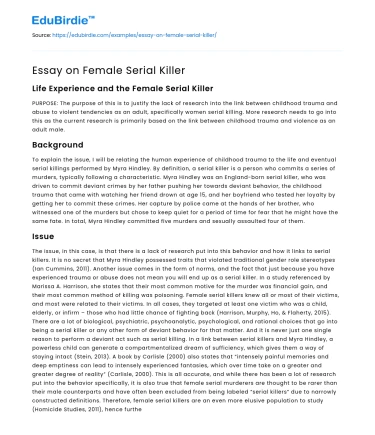Life Experience and the Female Serial Killer
PURPOSE: The purpose of this is to justify the lack of research into the link between childhood trauma and abuse to violent tendencies as an adult, specifically women serial killing. More research needs to go into this as the current research is primarily based on the link between childhood trauma and violence as an adult male.
Background
To explain the issue, I will be relating the human experience of childhood trauma to the life and eventual serial killings performed by Myra Hindley. By definition, a serial killer is a person who commits a series of murders, typically following a characteristic. Myra Hindley was an England-born serial killer, who was driven to commit deviant crimes by her father pushing her towards deviant behavior, the childhood trauma that came with watching her friend drown at age 15, and her boyfriend who tested her loyalty by getting her to commit these crimes. Her capture by police came at the hands of her brother, who witnessed one of the murders but chose to keep quiet for a period of time for fear that he might have the same fate. In total, Myra Hindley committed five murders and sexually assaulted four of them.
Save your time!
We can take care of your essay
- Proper editing and formatting
- Free revision, title page, and bibliography
- Flexible prices and money-back guarantee
Issue
The issue, in this case, is that there is a lack of research put into this behavior and how it links to serial killers. It is no secret that Myra Hindley possessed traits that violated traditional gender role stereotypes (Ian Cummins, 2011). Another issue comes in the form of norms, and the fact that just because you have experienced trauma or abuse does not mean you will end up as a serial killer. In a study referenced by Marissa A. Harrison, she states that their most common motive for the murder was financial gain, and their most common method of killing was poisoning. Female serial killers knew all or most of their victims, and most were related to their victims. In all cases, they targeted at least one victim who was a child, elderly, or infirm – those who had little chance of fighting back (Harrison, Murphy, Ho, & Flaherty, 2015). There are a lot of biological, psychiatric, psychoanalytic, psychological, and rational choices that go into being a serial killer or any other form of deviant behavior for that matter. And it is never just one single reason to perform a deviant act such as serial killing. In a link between serial killers and Myra Hindley, a powerless child can generate a compartmentalized dream of sufficiency, which gives them a way of staying intact (Stein, 2013). A book by Carlisle (2000) also states that “intensely painful memories and deep emptiness can lead to intensely experienced fantasies, which over time take on a greater and greater degree of reality” (Carlisle, 2000). This is all accurate, and while there has been a lot of research put into the behavior specifically, it is also true that female serial murderers are thought to be rarer than their male counterparts and have often been excluded from being labeled “serial killers” due to narrowly constructed definitions. Therefore, female serial killers are an even more elusive population to study (Homicide Studies, 2011), hence further research should be conducted on the female serial killer as a whole and how life experiences affect them, and also how they vary from actions and behaviors of the male serial killer. Also due to the rareness of the female serial killer, courts often provide a more lenient sentence than her male cohort, if there is one; Myra Hindley being one of the rare exceptions (Davis, 2014).
Recommendations
The issue focused on the link between behavior and serial killers requires further research. One thing that was abundantly clear while doing research is that the majority of sources are done about men, so a recommendation would be to do further research on what makes a female serial killer specifically. Another research-based recommendation would be to do more research on the effects childhood trauma and abuse can have on women specifically that lead them onto a path of serial killer, and whether male input has led them to do this.
References
- Carlisle. (2000). The dark side of the serial-killer personality. In, Serial Killers, ed. L. Gerdes. San Diego, CA: Greenhaven Press.
- Davis, C. A. (2014). Women Who Kill: Profiles of Female Serial Killers.
- Farrell, A. L., Keppel, R. D., & Titterington, V. B. (2011). Homicide Studies. Lethal Ladies: Revisiting What We Know About Female Serial Murderers, Vol 15, Issue 3.
- Ian Cummins, M. F. (2011). Hindley: ‘The Evilest Woman in Britain’? Serial Killers and the Media, 115-134.
- Stein, A. (2013). Prologue to Violence: Child Abuse, Dissociation, and Crime. Routledge.






 Stuck on your essay?
Stuck on your essay?

